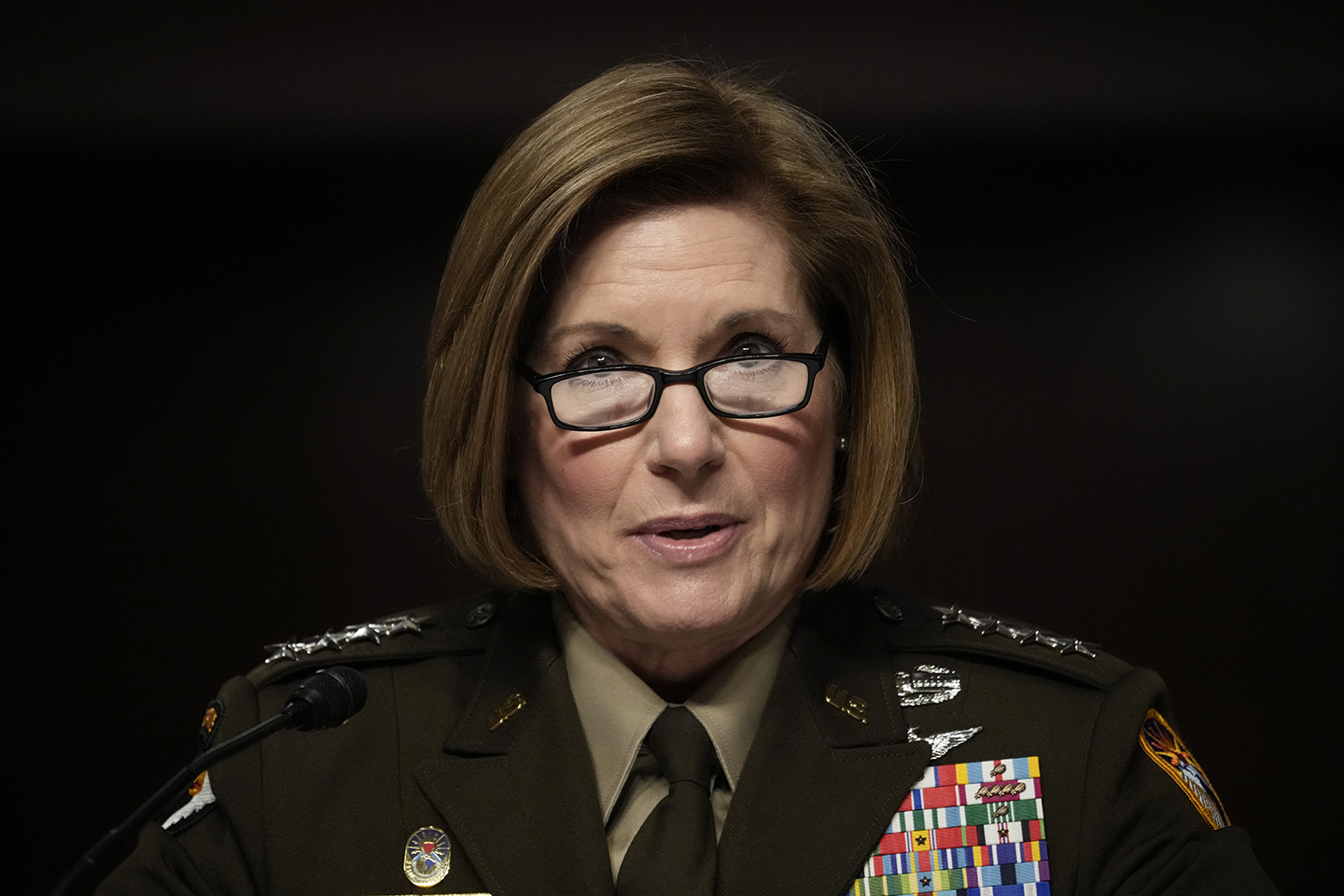Gen. Glen D. VanHerck, commander of the North American Aerospace Defense Command and U.S. Northern Command, testifies before the Senate Armed Services Committee in March 2022.
THE WATCH STAFF
Much like footprints left on the white sand beaches of the Caribbean, the imprints made by the People’s Republic of China (PRC) can be found all over the region. But unlike the tracks of beachgoers, the Chinese presence is not so easily swept away.
By using tools ranging from government loans to business investment to cultural exchange, the PRC has extended its reach well beyond the Indo-Pacific and is challenging the United States for influence in the Western Hemisphere.
That is becoming increasingly worrisome to U.S. political and military leaders.
In his 2021 Congressional testimony to the Senate Armed Services Committee, Gen. Glen D. VanHerck, commander of the North American Air Defense Command (NORAD) and USNORTHCOM, stated.
“While the United States remains the economic and military partner of choice in the region, China is seeking to grow its trade and investment in Mexico and, over the past few years, has invested in the Bahamas’ vital tourism sector through marquee infrastructure projects.”
His counterpart, Gen. Laura J. Richardson, Commander, U.S. Southern Command (USSOUTHCOM), made similar remarks to the Senate Armed Services Committee on March 24, 2022, according to Department of Defense (DOD) News.
“China continues its relentless march to expand economic, diplomatic, technological, informational and military influence in Latin America and the Caribbean, and challenges U.S. influence in all these domains,” Richardson testified.
Both combatant commanders shared their concerns on attempts by the PRC to gain influence in the Western Hemisphere including Mexico, Latin America and the Caribbean.

USNORTHCOM’s areas of responsibility (AOR) includes Mexico, the Bahamas and British Overseas Territories (BOTs) – Bermuda and Turks and Caicos Islands. USSOUTHCOM’s AOR includes Central America, South America and the Caribbean.
The U.S. has a 50-year bilateral partnership with the Bahamas, which is a key regional security partner. USNORTHCOM, along with other U.S. agencies, supports the Bahamas in areas that include the interdiction of illegal drugs, joint military training with the Royal Bahamas Defence Force, humanitarian aid during natural disasters and civic outreach. A small example: USNORTHCOM, the National Emergency Management Agency (NEMA) and USAID on March 13, 2023, donated 28 generators, six reverse-osmosis systems and safety equipment to its neighbor ahead of hurricane season.
In March 8, 2023, testimony to the House Armed Services Committee, both generals pointed to the expansion of the PRC’s One Belt, One Road Initiative, which CNN described as a “massive international infrastructure project that seeks to project Chinese influence around the world.” Those projects, they said, include efforts they likened to “economic coercion” in countries such as the Bahamas, CNN reported.
As of 2022, 10 Caribbean countries have signed the initiative, according to a 2023 report by the U.S. House Foreign Affairs Committee: Antigua and Barbuda, Barbados, Cuba, Dominica, Dominican Republic, Grenada, Guyana, Jamaica, Suriname, and Trinidad and Tobago.
These small Caribbean markets “lack the sizable reserves of minerals and other raw materials that often draw Chinese attention,” according to a November 8, 2020, report in The New York Times, but the newspaper pointed out that the region has “strategic importance as a hub for logistics, banking and commerce, analyst say, and could have great security value in a military conflict because of its proximity to the United States.”
Evan Ellis, a professor of Latin American studies at the U.S. Army War College, said the PRC understands the strategic importance of the region. “There are a lot of reinforcing reasons that go beyond balance sheets,” he told the newspaper.
Stacey E. Plaskett, the U.S. Virgin Islands’ delegate to the House of Representatives, wrote in a July 7, 2023, opinion column for The Hill newspaper that the PRC “knowingly goes into these [investment] deals with vulnerable countries with the intention of predatory lending practices.”
The Chinese loans are backed by collateral commitments that include lease rights, minerals or other assets, according to Plaskett.
The PRC offers Caribbean nations “an alternative source of funding for infrastructure projects and economic development which seem appealing because they do not necessarily have to repay the loans monetarily,” Plaskett wrote in The Hill. “However, in place of this, the Chinese government will demand control of significant pieces of infrastructure which they helped finance, namely ports. These ports around the region will make strategic spots for the potential projection of military power like bases and surveillance.”
One infrastructure example: Hutchison Port Holdings, a subsidiary of PRC-affiliated Hutchison Whampoa, owns and operates the Freeport Container Port in the Bahamas, according to the House Foreign Affairs Committee report.
Politico Magazine, in a December 12, 2022, story, called such investments “trickier but no less belligerent set of challenges to the U.S. and its allies than China’s overt military buildup.”
The PRC’s activities in the Caribbean go beyond economic investment.
The House Foreign Affairs Committee report said the PRC is “working towards diminishing the region’s ties to Taiwan as the region contains the largest bulk of Taiwan’s diplomatic allies. Today, St. Lucia, St. Vincent and the Grenadines, St. Kitts and Nevis, Haiti, and Belize remain the only Caribbean nations that recognize Taiwan.”
U.S. lawmakers are now asking the Treasury Department to curb what they say is an outsized role of Beijing at the noncommercial Inter-American Development Bank (IDB), which supports economies across Latin America and the Caribbean, according to a July 25, 2023, report by The Associated Press (AP). The lawmakers say Beijing is using the bank as a tool to expand the “malign influence” of the PRC in the region, according to AP.
The U.S. is the largest shareholder in the bank, which is made up of member countries, according to AP, with a roughly 30% voting share. “At issue is the number of contracts the IDB awards to Chinese firms relative to its meager share of the bank, which hovers around 0.1 percent,” the AP report said.
In 2022, Latin American and Caribbean trade with China rose to record levels, exporting roughly $184 billion to China and importing an estimated $265 billion in goods, according to a Boston University Global Development Policy Center analysis.
USNORTHCOM and USSOUTHCOM are working together to mitigate and contest the influence of strategic competitors in their AORs while supporting allies and partners. “We continue,” VanHerck said in his 2021 Senate testimony, “to defend all domains.”

